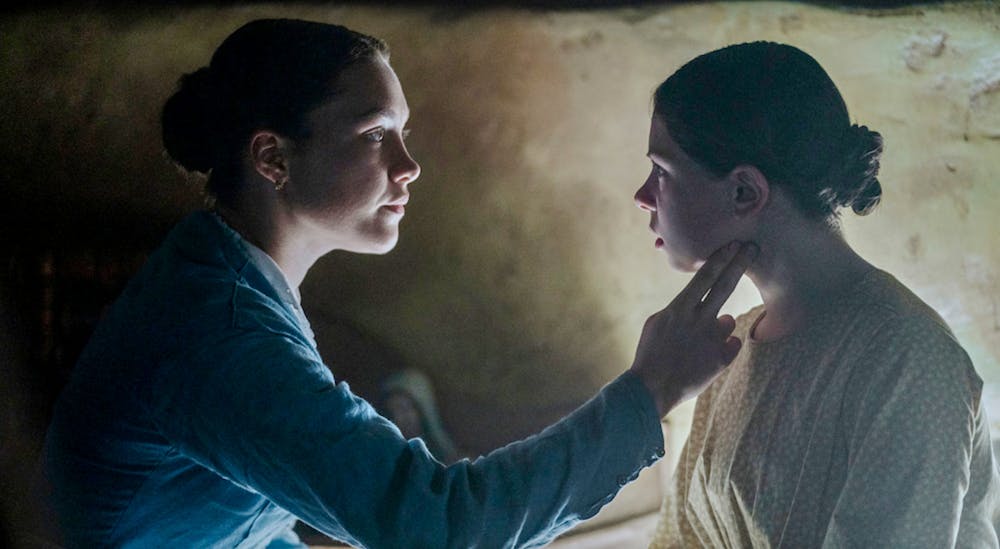From its start, the new Netflix film “The Wonder” evokes confusion and excitement when it opens on a plywood house in a barren soundstage — decidedly removed from the breathtaking, 19th-century hills of Ireland where it supposedly takes place in. The camera slowly pans to an open warehouse filled with setpieces before an unknown woman informs us: “This is the beginning of a film called ‘The Wonder.’ ”
She continues, “We are nothing without stories. And so, we invite you to believe in this one.” The camera then pans to a full set — the interior of a ship — bringing the viewer to 1862 and the world of Lib Wright (Florence Pugh), a nurse on a voyage from her native England to a remote Irish village still recovering from a famine that occurred a decade prior. From there, the strange, omniscient narrator is no longer there to guide the viewer through the plot — it is now incumbent upon the viewer to do as she says — to believe.
“The Wonder” sets itself up to be something daring and original. While the actual product turns out to be a good movie, it achieves this status through less compelling means. The opening scene of the film could have paved the way for some kind of meta-narrative that rips the artificial construction of its own film to shreds. But these fourth-wall-breaking narrations are too inconsistent to be impactful. Rather, they are occasional reminders that stories can be just as full of wonder as they can be of deceit.
For most of its runtime, the film explores this idea. Wright’s objective in this village is to monitor a young girl named Anna O’Donnell (Kíla Lord Cassidy), whose family claims that she has not eaten in four months. But she seems perfectly healthy, a fact that O’Donnell claims (and believes) is due to her consuming “manna from heaven.” Wright is not convinced. As the observation continues, the world of the film opens up to a larger cast of characters. This includes the rest of the O’Donnell family, who are deeply religious and still mourning the loss of their son. Then there’s Will Byrne (Tom Burke), a journalist reporting on the story who believes it to be a hoax. And finally, there’s the town council, another deeply religious institution keeping an eye on Wright.
This cast of characters is perfectly constructed to explore concepts of truth and artificial storytelling articulated at the beginning of the film. The main conflict of the story stems from Wright and Byrne’s empirical ideologies clashing with the village’s long-held, unwavering faith. While this is not a novel idea in storytelling, it can still be compelling when explored artfully. For the most part, “The Wonder” executes this plot well. The dialogue is very stoic, but this choice is an effective one. There is no sensationalism, and no sense of a larger force casting down some grand moral judgment on the contents of the film. It feels authentic, which is ironic when the film literally begins by telling the viewer that everything is fake.
While the movie’s opening provides a perfect blueprint for how to explore its key ideas, it can be frustrating when it falls short of its own plan. At some crucial moments, the film opts for the easy way out, devolving into a standard cookie-cutter psychological mystery that is not all that interesting. The meta conflict of the film is far more compelling than the actual one.
But even if you escape from the ideas that the film presents and instead look at just what’s presented on the screen, there’s plenty to enjoy. It turns out that — when celebrity gossip is not surrounding her — Pugh can act like her life depends on it. She is perfectly subtle in a way that makes each minor shift in her facial expression tell a whole story. Cinematographer Ari Wegner knows exactly what is needed to frame and highlight that emotion. Sometimes it can seem like cheating when the film has a backdrop as stunning as rural Ireland, but Wegner finds the full potential of these striking landscapes. If the film was just two hours of Pugh wandering through foothills and sprawling plains, it would be flawless.
“The Wonder” has all the pieces needed to make an incredible film, but it just sometimes does not know the best way to put them all together. The film oscillates between being compelling and original and something that is worn out and predictable. The ending is a little too cute and precious considering the film as a whole, but “The Wonder” is so good at what it does that its downsides are more unfortunate disappointments than they are sources of ruin.

Finn Kirkpatrick was the senior editor of multimedia of the Brown Daily Herald's 134th editorial board. He is a junior from Los Angeles, California studying Comparative Literature and East Asian Studies. He was previously an arts and culture editor and has a passion for Tetris and Mario Kart.





